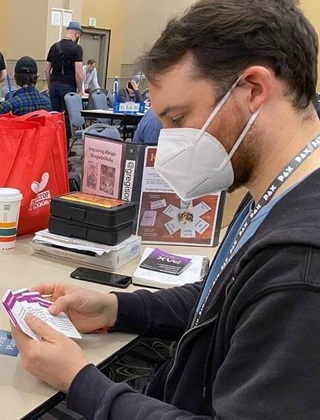Catching up with Greg Loring-Albright, PhD Communication, Culture and Media '22
By Sarah Hojsak
March 6, 2023

Greg Loring-Albright, PhD '22, has always loved games, but when he decided to pursue this interest professionally, finding the right graduate program wasn't easy. The interdisciplinary model of Drexel’s Communication, Culture and Media (CCM) program proved to be the foundation he needed to pursue his unique path of study.
“No university would let me study what I wanted to study except for Drexel,” he recalled. Loring-Albright's dissertation analyzed digital adaptations of tabletop games using media ecology—the study of how different forms of media communication affect humans. He’s now an assistant professor in the Interactive Media Department at Harrisburg University, where he teaches game studies and game design, while also designing games independently as a side gig. “I teach students, and I do a little bit of research, and I make games,” he describes his career.
Loring-Albright's interest in games was sparked at a young age. Growing up, his parents would create elaborate scavenger hunts for his sister and him to solve. “I would be going all over our house finding clues and solving riddles,” he reminisced. “I don't know if I draw a direct line from that to my current game design practice, but there's definitely a lineage there for sure.”
Read more in the Q&A below.
 Greg playtesting a game-in-progress at PAX Unplugged 2022. Photo by Liz Davidson.
Greg playtesting a game-in-progress at PAX Unplugged 2022. Photo by Liz Davidson.
Did you always know you wanted to pursue a PhD?
I worked in the specialty coffee industry for seven years and then I decided to go back and get a PhD. My day job was working in coffee, but in my spare time I was working with a friend who made event games and reading a bunch of game studies and design books. My partner was like, “You really like this stuff, and you're always reading books about it. Why don't you go get a degree?” That kickstarted the process for me to eventually apply and matriculate to Drexel.
Why was Drexel’s Communication, Culture and Media program the right fit for you?
The Communication, Culture and Media program is so interdisciplinary. All kinds of awesome stuff goes on there; everyone is studying something weird. I knew I wanted to study non-digital games—I’m not a video gamer—and Drexel was one of the few places where I could study that. They were like, “You want to talk about board games in your dissertation? Awesome. Come on over."
What was your experience in the CCM program like? How has it influenced your current career?
I came in with three other students in my cohort, and it was an awesome group—our third weekend in the program we all went camping together. I think some of that is because of the program’s interdisciplinary nature. Even though the students all participate in communication studies, cultural studies and media studies, they’re all on different branches. You might not know anything about the other students’ research, but you get more perspectives. The program does a great job giving us both broad and narrow competencies. Now, when I encourage my students to think about social theory or teach them research methods, all that is stuff I learned through the CCM program at Drexel.
What classes are you currently teaching?
I'm teaching Game Studies, which introduces students to the academic apparatus of figuring out how games mean things. We're practicing analyzing games, discussing theories and talking about things like representation in games and how games relate to film and semiotics. These were all things I studied for my dissertation and now I get to teach a crew of undergrads this stuff, which is awesome. I'm also teaching Intro to Game Design, where I get to apply my game design practice.
How do you balance being a professor and a game designer?
I design board games and role-playing games. I’ve signed contracts and I get royalties, but it’s mainly a hobby. I published two titles in 2022. I was a co-designer on a game called "Bloc by Bloc: Uprising" and I solo designed a game called "Ahoy." I’m currently working on the official board game adaptation of Howard Zinn’s A People's History of the United States. I'm always working on some game in the background, after my kids go to bed or when I should be grading my students’ work.
What is the process of designing and publishing a game?
I design a game I like, write the rules, get the components and playtest it with friends and family and strangers. When I think it’s good and finished, I show it to a publisher, usually in person at a convention. My big convention is PAX Unplugged, which happens in Philly every December. Digital pitching is starting to become more common, but I've had better luck pitching in person. It's similar to a relationship with a book publisher—I’m like an author writing a manuscript and selling it to a publisher, and then the publisher takes care of putting the cover on it and laying out the pages and getting it printed. It’s essentially out of my hands at that point.
What advice would you give to a current student looking to pursue a similar career?
My advice for getting into game design, especially for Drexel students, is that Philly is a great game design town. The city is having an explosion of creativity right now. People I knew, who play-tested some of my designs that just got published, are now getting their own designs published. If you want to work with some of the best game designers out there right now, Philly has them. In terms of academia, building a network is important.
What are you most looking forward to in your career?
Until recently, I was a graduate student and an unpublished board game designer. I've built up industry connections in the board game world and in academia, and now I can pass my knowledge and connections along to my students. Being in the classroom with undergrads at Harrisburg University, I get to see new talent and people having new thoughts and interesting ideas about games. I'm excited to be in a place where I can help foster their work.